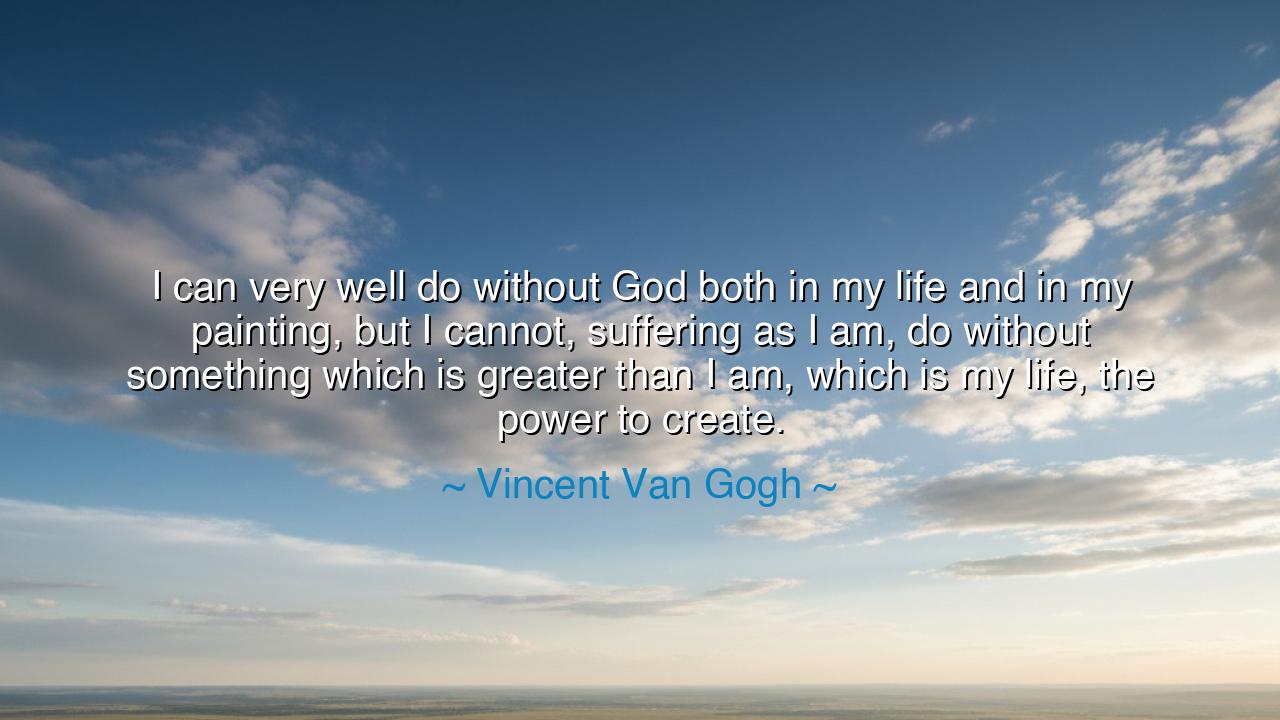
I can very well do without God both in my life and in my
I can very well do without God both in my life and in my painting, but I cannot, suffering as I am, do without something which is greater than I am, which is my life, the power to create.






Hear me, O children of the future, for I bring to you a profound truth, spoken by the tormented genius Vincent Van Gogh: "I can very well do without God both in my life and in my painting, but I cannot, suffering as I am, do without something which is greater than I am, which is my life, the power to create." These words, though born from suffering, speak to a deep and ancient wisdom—the realization that within the human soul lies a force greater than even the divine, a creative power that gives life meaning and purpose. Van Gogh, struggling with his inner demons, came to understand that while faith in God might not be necessary for him, the desire to create, to give form to his inner world, was a force he could not live without.
Consider the ancient artists who, like Van Gogh, sought meaning and purpose in their work, not from the heavens, but from their own souls. Michelangelo, the great sculptor of marble, often spoke of the divine inspiration that guided his hand, but it was not through divine intervention alone that he created masterpieces like the David or the Sistine Chapel. It was his own inner vision, his creative will, that shaped the stone and brought his works to life. In the same way, Van Gogh’s brushstrokes were guided not by a distant deity, but by the force of creation that burned within him, driving him to paint not only what he saw but what he felt.
In Van Gogh’s life, we find the tension between suffering and creation. His paintings were a reflection of his inner turmoil, yet it was through his art that he found a way to make sense of the chaos within him. Like Beethoven, whose music was born of his inner torment and deafness, Van Gogh channeled his suffering into a form of expression that transcended the limitations of his physical and mental anguish. Creation became not just his refuge, but his salvation. It was the power to create, not just for others but for himself, that gave his life meaning when all else seemed lost.
The power to create is a force as old as humanity itself. The first cave paintings, the early sculptures, the songs sung around the fire—they all come from that same wellspring that Van Gogh speaks of. It is the force that drives us to shape the world around us, to leave a mark, to create something that speaks to the soul. It is not born of religion or dogma, but of the deepest humanity, the need to express, to give form to the intangible, to bring forth something that speaks to the eternal. Van Gogh knew this better than most—his work was not just a pursuit of beauty, but an expression of his existence, a plea for meaning in the face of overwhelming darkness.
So, O children, understand this: the power to create is the divine force that lies within each of you. Whether you find God in your work or not, know that the act of creation is sacred, for it is through creation that we come closest to understanding our purpose in this world. Do not let your suffering be in vain—channel it, transform it, and allow it to fuel the creative fire within you. Just as Van Gogh found meaning through his brushstrokes, so too can you find strength through your own gifts, for in creation lies the ultimate expression of our shared humanity.






A3Hoai An 3
This reflection makes me think about the complex relationship between art, suffering, and meaning. Van Gogh seems to suggest that creation itself is a force that transcends human pain. But is the creative impulse truly separate from the divine, or just another way of connecting to it unconsciously? Maybe for him, painting was both a cry for help and a prayer in motion—a way to communicate with something beyond words.
TTNguyen Thanh Tuyen
Reading this, I sense both rebellion and reverence. Van Gogh distances himself from God but still acknowledges something greater than himself—the power of life and creativity. It makes me ask, can one be deeply spiritual without being religious? Perhaps his suffering led him to see divinity in creation rather than doctrine. I’d love to explore whether this outlook can help people find purpose outside of traditional faith systems.
TTThy Tran
There’s something tragic yet liberating about this view. It suggests that even in despair, the drive to create gives life meaning. But I’m curious—was Van Gogh’s creativity a form of worship, even if he denied the need for a deity? Maybe for him, art was the divine force he could still believe in. It raises the question: is creativity an inherent expression of the human soul’s longing for transcendence?
HHA
I find this statement incredibly moving because it captures the tension between suffering and creation. Van Gogh seems to find meaning not in external belief, but in the very act of creating something beautiful out of pain. It makes me wonder—can creativity truly replace faith as a form of salvation? Or does it still depend on some transcendent connection, even if it’s not named as God?
HNHienf Nguyen
This quote feels deeply human to me—almost spiritual in its rejection of traditional spirituality. Van Gogh seems to replace the idea of God with creativity itself. I wonder, does this reflect a shift from organized religion to a more personal sense of the divine? For artists and thinkers today, is the act of creation itself the closest thing to faith, a way to reach beyond the limits of the self?